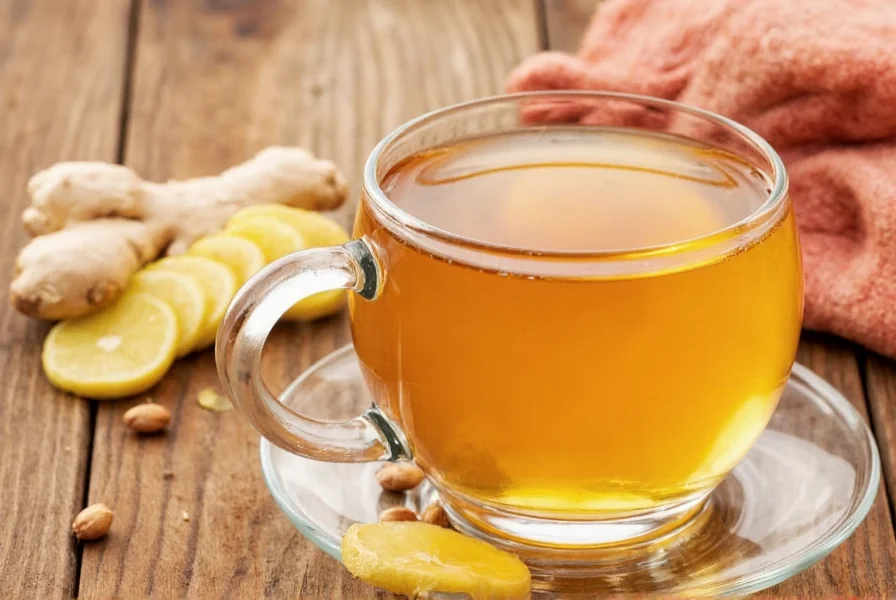Constipation affects millions worldwide, prompting many to seek natural remedies like ginger tea. This ancient root has been used for centuries across various traditional medicine systems to address digestive discomfort. Modern research is now beginning to validate some of these traditional uses, particularly regarding ginger's effects on gastrointestinal motility.
The Science Behind Ginger and Digestive Health
Ginger contains bioactive compounds called gingerols and shogaols that interact with the digestive system in several beneficial ways. A 2017 study published in Food Science & Nutrition demonstrated that ginger supplementation significantly reduced gastric emptying time in participants. Another clinical trial found that ginger accelerated colonic transit by approximately 30% compared to placebo.
These effects occur because ginger:
- Stimulates the production of digestive enzymes
- Enhances smooth muscle contractions in the intestines
- Reduces inflammation in the gastrointestinal tract
- May help relax the pyloric valve, allowing food to move more freely

How to Prepare Effective Ginger Tea for Constipation
Not all ginger teas deliver equal benefits for constipation relief. Commercial tea bags often contain minimal active compounds compared to fresh ginger. For maximum effectiveness when making ginger tea for constipation:
| Ingredient | Amount | Preparation Tip |
|---|---|---|
| Fresh ginger root | 1-2 inches | Peel and grate for maximum compound extraction |
| Water | 2 cups | Use filtered water at just below boiling point |
| Lemon juice | 1/2 lemon | Add after steeping to preserve vitamin C |
| Honey (optional) | 1 teaspoon | Use raw honey for additional digestive benefits |
Bring water to a boil, add grated ginger, and simmer for 10-15 minutes (longer for stronger tea). Strain and add lemon juice. Drink 15-20 minutes before meals to stimulate digestive processes. For constipation relief, limit to 2-3 cups daily as excessive consumption may cause heartburn.
Expected Results and Limitations
When using ginger tea for constipation relief, most people notice mild improvement within 24-48 hours for occasional constipation. However, ginger tea works best as part of a comprehensive approach that includes adequate hydration and fiber intake. It's important to understand that ginger tea won't provide immediate relief like laxatives and may not be effective for severe or chronic constipation.
Research indicates ginger tea is most effective for:
- Mild, occasional constipation
- Constipation related to slow gastric motility
- Digestive sluggishness after rich meals
- Preventing constipation during travel
It's less effective for constipation caused by:
- Severe dehydration
- Medication side effects
- Structural issues in the digestive tract
- Neurological conditions affecting digestion
Safety Considerations and Potential Side Effects
Ginger tea is generally safe for most adults when consumed in moderate amounts. However, certain individuals should exercise caution or avoid ginger tea for constipation relief:
- Pregnant women should consult their healthcare provider before regular consumption
- People taking blood thinners as ginger may increase bleeding risk
- Those with gallstones as ginger may increase bile production
- Individuals with GERD as it may exacerbate symptoms
Common side effects of excessive ginger consumption include heartburn, mouth irritation, and mild stomach discomfort. If you experience diarrhea after drinking ginger tea, reduce your dosage as this indicates overstimulation of your digestive system.
When to Seek Medical Attention
While natural remedies like ginger tea can help with occasional constipation, certain symptoms require professional medical evaluation. Consult a healthcare provider if you experience:
- Constipation lasting longer than 2 weeks despite home remedies
- Blood in your stool
- Unexplained weight loss
- Severe abdominal pain
- Constipation alternating with diarrhea
Chronic constipation may indicate underlying conditions such as irritable bowel syndrome, hypothyroidism, or more serious gastrointestinal disorders that require proper diagnosis and treatment.
Complementary Approaches for Constipation Relief
For optimal results when using ginger tea for constipation, combine it with these evidence-based approaches:
- Adequate hydration - Drink at least 8 glasses of water daily
- Dietary fiber - Consume 25-30g of fiber from fruits, vegetables, and whole grains
- Physical activity - Aim for 30 minutes of moderate exercise daily
- Establish regular bathroom habits - Try to go at the same time daily
- Prune juice - Can be alternated with ginger tea for enhanced effect
Remember that consistency matters more than any single remedy. Incorporating ginger tea into a comprehensive digestive health routine yields better results than relying on it as a standalone solution for constipation relief.
Frequently Asked Questions
How quickly does ginger tea work for constipation?
Most people notice mild improvement in digestive movement within 24-48 hours of regular ginger tea consumption. For best results, drink freshly brewed ginger tea 15-20 minutes before meals to stimulate digestive processes. However, ginger tea works gradually as a digestive aid rather than providing immediate relief like pharmaceutical laxatives.
Can I drink ginger tea every day for constipation?
Yes, you can safely consume ginger tea daily for constipation relief, but limit to 2-3 cups per day. Excessive consumption (more than 4 grams of ginger daily) may cause heartburn or stomach upset. For chronic constipation, consult a healthcare provider rather than relying solely on daily ginger tea, as persistent digestive issues may require medical evaluation.
Is fresh ginger better than ginger tea bags for constipation relief?
Yes, fresh ginger generally provides more potent constipation relief than commercial tea bags. Fresh ginger contains higher concentrations of active compounds like gingerols. When making ginger tea for constipation, use 1-2 inches of freshly grated ginger simmered for 10-15 minutes. Most tea bags contain minimal ginger content and may lose potency during processing and storage.
Can ginger tea cause diarrhea while treating constipation?
Yes, consuming too much ginger tea can stimulate the digestive tract excessively, potentially causing diarrhea. This is more likely if you're sensitive to ginger or consume more than 3 cups daily. If you experience loose stools, reduce your ginger tea intake. The goal is gentle stimulation of digestion, not aggressive purging, which can lead to dehydration and electrolyte imbalance.
What's the best time to drink ginger tea for constipation relief?
The optimal time to drink ginger tea for constipation relief is 15-20 minutes before meals, particularly breakfast and dinner. This timing allows ginger's compounds to stimulate digestive enzymes and gastric motility before food enters your system. Some people also find benefit from drinking a cup in the morning on an empty stomach to kickstart digestion for the day.











 浙公网安备
33010002000092号
浙公网安备
33010002000092号 浙B2-20120091-4
浙B2-20120091-4